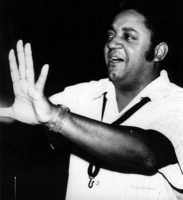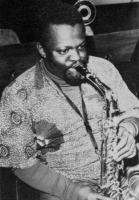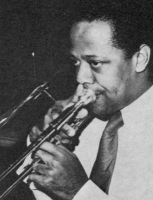Oliver Nelson
with the Berlin Dream band

Report by Ron Simmonds in 1971
Like everyone else, I had my share of nightmares when I was a kid. I fell out of tall buildings, got chased by bogeymen, found myself in the middle of the High Street with no clothes on and so on. I remember having particular trouble with one of those air–rifles which one breaks open to load; with me the thing would never stay closed and every time I tried to fire at one of the bogeymen the damned barrel would slowly hinge down again. Actually, the bad dreams were more boring than frightening and they stopped altogether when I was twelve years old. But several years later, once I’d established myself in the music business, another kind started up and this took the form of a professional anxiety nightmare.
It was always the same: I’d find myself in a band room a couple of minutes before the show was due to begin, with no dress suit, no white shirt and brown shoes and by the time I’d found everything and struggled into it the band had started playing. I’d get on to the stand finally and sit down. On both sides the other trumpet players would be blowing their heads off. “Where are we?” I’d ask. A colleague would point to the music stand in front of me. On it was a picture: a castle, some houses, mountains, cows, chickens . . . and his finger would land somewhere in the middle, and that’s the nightmare—how do you go about playing a picture? I found out the other day when Oliver Nelson arrived here to lead the Berlin Dream Band for this year’s Berlin Jazz Festival.
This band is formed each time just for the Jazz Tage by taking nine or ten musicians from each of the two big radio station bands in West Berlin and bringing an American bandleader over to front them. Last year Stan Kenton misjudged the calibre of these musicians and brought over a pile of his old charts—which earned him the biggest chorus of booing I’ve ever heard from a festival audience. But Oliver Nelson made no such mistake.
I was called late to the first rehearsal (literally yanked out of bed)—came into the studio bleary–eyed and was confronted with the following sight, which my colleagues were already busily and expertly playing:

You see? The castle, the houses and the mountains were all there. Only the cows and chickens were missing. It was my nightmare come to life.
Oliver Nelson is a quiet–spoken, courteous gentleman of 38 who never seems to stop smiling. He did this right through the first rehearsals of the Dream Band, whilst the rest of us were sweating and cursing all around him; for flipping the title picture revealed pages and pages of sixteenth notes, which would have put even the Arban Tutor to shame. But even while we were spitting and spluttering through all of this the first time, the arrangement still sounded great. After we’d mastered it, it sounded fantastic. And Nelson knew it would—that’s why he kept smiling.
In fact, the band was so good on the concert that we quite probably stole some of the thunder of the two giants: Buddy Rich and the Clarke/Boland band with Dizzy Gillespie, who were due to appear the next night, Nelson himself was completely knocked out, arranged a recording session for us and stayed on an extra ten days to write the new scores for it.
We strolled into the studio on the day, laughing and joking, fully expecting to be playing all the now–familiar pieces plus one or two little extras; but he’d written four new works—two of them, as before, absolutely black with sixteenth notes. Nowhere to breathe or even think, and one total lip destroyer. Also, instead of the week we usually get for these Dream Band rehearsals, we had to get them right and record them all inside six hours. And still he kept smiling.
The theme of the record was Berlin, and he’d titled the pieces accordingly: “Kurfürstendamm” (the main street), “Wannsee” (one of the lakes), “Berlin By Night”, “Heidi” (which I’ll tell you about in a moment) and “Berlin Dialogues Of 1970”. This last–named was commissioned for the festival, is in four parts and represents the East–West conflict in this town. To get an idea of the length of this one piece: he told the engineers to be sure and have at least 30 minutes of tape on the machine, because we were going to record it in one go without stopping to reload. As it turned out we only recorded it once, anyway, and it ran for twenty minutes.
The routine of getting the balance
right was hilarious, because we did the session in the Radio Free
Berlin studio, where most of us work, and these German technicians have
their standing orders. Oliver went up to hear the first run–through
of “Wannsee”, which featured Leo Wright’s flute and Carmell Jones on
Flügelhorn.
“That’s beautiful,” he said, and the engineers stiffened with pride. “NOW—I want more of everything”. This was a great joke. More of everything to them meant merely increasing the playback volume. They did this. His smile faded slightly. “No, no—I mean: MORE OF EVERYTHING!”
“But”, they said, “our limiters, our cut–offs, our equalizers . . .”
“Unlimit the limiters,” he answered, showing perfect white teeth, “cut off the cut–offs, and unequalize the equalizers. Raise that microphone, change that filter, tote that barge and lift that bale . . .” and for four hours he had the engineers in a panic, running up and down with armloads of cables and plugs until the place looked like a spaghetti works. (“What is all this messing around with cables?” he asked. “In Los Angeles we just press buttons to change circuits.“) Finally they wound up with a balance which satisfied him, and which meant that every single switch on the console was right up at the top in the fully open position.
“DON’T TOUCH THEM!” he warned; then his voice dropped to a purr: “And now—we’re going to make some music!”
As this record is very likely going
to make some history, I’ll give the line–up in full, plus each  man’s
nationality just to show you what a Tower of Babel we have here.
man’s
nationality just to show you what a Tower of Babel we have here.
Trumpets: Milo Pavlovic (Yugoslavia), Ron Simmonds (Canada), Carmell Jones (USA), Manfred Stoppacher (Austria), Harry Samp (Germany).
Trombones: Ake Persson (Sweden), Barry Ross (USA), Slide Hampton (USA), Jean Orieux (France), Kurt Masnick (Germany).
Saxes: Leo Wright (USA), Klaus Marmulla (Germany), Rolf Roemer (Germany), Adi Feurstein (Germany), Freddy L’host (Belgium) Jan Konopasek (Czechoslovakia).
Piano: Kai Rautenberg; bass: Hajo Lange; drums: Heinz Niemeyer (all German), and drums: Dai Bowen (Wales).
On the festival one of the showstoppers
came in “Milestones”, when Slide, Barry and“Charles” Orieux took off
in a set of hair–raising trombone solos (Ake was away with Clarke/Boland
at the time), but on the record Slide took all the solos himself and
almost broke up the studio doing it. He’s a phenomenal player who just
gets better and better as he goes  on and on. Just when you think it must be time for his lip to bust open
or something, he sort of squares his shoulders—and then he really gets
started! Leo was in great shape, as he always is, and so was Carmell,
but the man whose playing actually brought tears to my eyes was Oliver
Nelson himself, on his slow piece called “Heidi”.
on and on. Just when you think it must be time for his lip to bust open
or something, he sort of squares his shoulders—and then he really gets
started! Leo was in great shape, as he always is, and so was Carmell,
but the man whose playing actually brought tears to my eyes was Oliver
Nelson himself, on his slow piece called “Heidi”.
For the brass this was a killer, because we never stopped playing all the way through, building up about four minutes of background chords until we were roaring out in the upper reaches. Bulging–eyed, red–faced, and it was then that I thought I felt something break inside my head. Milo was playing bars and bars of long, slow, agonising top Es and was locked on to them so positively that I’m convinced you could have picked him out of the chair and he would have retained the exact same posture, as if fashioned out of steel with all working parts firmly bolted down. We almost had to pry him loose afterwards.
On top of all this, Oliver was playing an alto solo which is definitely only for listeners with strong nerves. It was love–at–first–sight, courtship, passion—all pouring out from the heart.
“Good grief,” I said damply to him afterwards, “How can you play like that?”
“It’s all right for you,” he replied, “but what’s my wife going to say when she hears that?”
Oliver Nelson will take the raw tapes back to the States with him and put the finishing touches to the balance there before issuing the record, but I don’t think that this is the last we’ll be seeing of him over here.
Like many other American musicians, he finds the atmosphere in Europe refreshing. And he wants more freedom to experiment, especially with his hobby of electronic music, which his film work in Hollywood doesn’t leave him much time to indulge.
“We’ve got to move on,” he says. “The music we make for TV and cinema films all gets squashed on to a narrow–frequency track with the dialogue and sound effects. What we’re getting back is Low Fidelity music. Maybe all right for those little TV loudspeakers—but not for me. I want to be able to write for piccolos and tubas and hear them come out on the tape properly; at the moment we’re hardly touching the full frequency range of the human ear—but I want to get up into the dogs and pigs hearing range!”
Some of his time in Berlin was spent in an electronic music studio looking over the equipment, and he could quite well decide to spend a year or so here later on. If he does, no one will be happier than the Berlin musicians; it’s been a pleasure and a revelation to work with him. The joy hasn’t all been one–sided either. “What’s going on here?” he exclaimed the first day. “White musicians aren’t supposed to be able to play jazz!”
Other quotes during the recording session: Slide Hampton (to me): “Well, I’ve played sessions in New York studios alongside all of the best trumpet players in that town and even they never played the way you guys do.” (Careful...this could have a double meaning.)
Leo Wright (about Oliver Nelson): “This man is really doing something. This is the way to settle all our troubles back home—not by rioting or burning and smashing up the place, but by showing people what we can create.”
Ake Persson said later on: “It sounds fantastic and I think everyone is surprised, including us. It proves, though, that the musician is superior to the arrangement every time.”
For myself, if the title of the record hadn’t already been fixed to the Berlin theme, I would have liked to have borrowed from his latest record release Black, Brown And Beautiful and rearranged the words a little to cover the unique occasion. Because this time we were all in it together.
Copyright © 2000, Jazz Professional. All Rights Reserved.